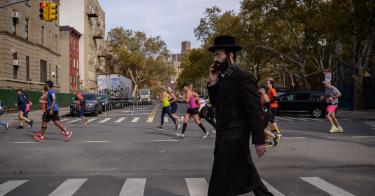New York’s Orthodox Jewish schools, or yeshivas, won a major victory in court last week. However, fully resolving the issues raised in the lawsuit will require legislative intervention.
Under pressure from a string of hostile and error-ridden stories in the New York Times and a campaign backed by the teachers union boss, Randi Weingarten, New York state has attempted to revive a century-old, largely dormant law that required students who enroll in private schools to be given an education that is “substantially equivalent” to that provided by New York’s public schools.
Last year the state issued new regulations to enforce this old statute, requiring inspections of nonpublic schools unless they were exempt due to their accreditation or participation in the state test. If the inspectors deem that private schools do not adequately cover the 18 subjects listed in state law, the state could require parents to unenroll their children and force the schools to close.
The state’s chasidic yeshivas were just about the only schools not covered by an exemption and would be subject to inspections and closure. In last week’s court decision, the judge stuck down the central part of the state’s effort to crack down on the yeshivas. The ruling forbids the state from closing private schools that failed inspections.
>>> Get the Facts Straight on Yeshiva Education
Judge Christina Ryba’s ruling noted that the law “places the burden for ensuring a child’s education squarely on the parent, not the school….” Parents can ensure that their children receive an education meeting all criteria of the compulsory education law, even if the school they choose does not.
Even if private schools do not cover everything required by substantial equivalence, Judge Ryba wrote, “parents should be permitted to supplement the education that their children receive at a nonpublic school” to be in full compliance, “such as by providing supplemental home instruction.”
Effectively, New York’s Compulsory Education Law treats everyone enrolled in noncompliant private schools as if they are hybrid homeschoolers who can cobble together their education from a combination of private school instruction and outside-of-school activities.
If the state wants to continue with its inspection regime and declare a number of yeshivas deficient, it will turn tens of thousands of private school students into hybrid homeschoolers, who will then have to complete various forms to describe how they are supplementing their private school instruction to comply with the compulsory education statute.
This will be a burden on those families, but it will be an even bigger burden on the state. Not only will state employees have to process and review all of these forms, they will then have to select which among the tens of thousands of families to investigate and—if found deficient after multiple rounds of remediation and appeals—which to sanction.
This will be a huge strain on state resources. Also it is certain to raise constitutional issues of discrimination and arbitrariness in selective enforcement that the judge ruled were “not yet ripe” in her decision last week.
There is an elegant solution that extracts the state of New York from this mess: Revise the Compulsory Education Law to redefine what constitutes an education.
>>> Victory for Common Sense: Federal Court Holds Title IX Religious Exemption Not Discriminatory
Currently, the law contains a highly prescriptive list of 18 subjects and other requirements, including instruction in highway safety and traffic regulations, arson prevention, CPR, sex ed, patriotism, and “the history, meaning, significance and effect of … the Constitution of the State of New York and amendments thereto.”
However, the statute fails to appreciate the educational value of a yeshiva education, which, as Professor Moshe Krakowski has described, “more closely resemble[s] upper-level humanities coursework in a university than clerical training or contemplation of the Divine.”
New York would be better served by adopting a broad definition of education, similar to other states, that would properly distinguish between the traditional, if atypical, approaches that yeshivas have been using for hundreds of years and real truants who are not being educated at all.
The yeshiva victory in court has fended off the prospect of the state closing their schools, but leaves the state—and families—facing an enforcement nightmare. Fortunately, the problem can be solved with a modest and entirely reasonable legislative fix.
This piece originally appeared in The New York Sun



